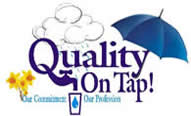
Health Care Facilities Public Act
What we know (so far) or think we know:
This “Act” updated the Illinois Environmental Protection Act (415 ILCS/5 seq). It added a new Section 19.11. The following is a summary of the new requirements:
- Health care facilities must be notified of disruption events to their water service.
"Disruption event" means any:
(1) change to a disinfection technique, practice, or technology, including each instance of any change in the concentration of any disinfectant in the water of a public water supply that results in residual concentrations of the disinfectant in the water either exceeding 50% or falling below 20% of the monthly average concentration of disinfectant reported to the Agency in a public water distribution entity's most recent monthly submission of Daily Operating Reports;
(2) planned or unplanned work on or damage to a water main;
(3) change in a treatment application or source of water that results in an altered finished water quality;
(4) event that results in a public water supply's operating pressure falling below 20 PSI; or
(5) condition that results in the issuance of a boil water order.
- Water systems are required to inventory their "Health care facilities" (hospitals, or establishment licensed or organized under the Ambulatory Surgical Treatment Center Act, the University of Illinois Hospital Act, the Hospital Licensing Act, the Nursing Home Care Act, the Assisted Living and Shared Housing Act, or the Community Living Facilities Licensing Act).
- Water systems will need to compile a list, get email addresses and contact information for these facilities. (Note: If water systems followed the IRWA ERP/EOP template this may already be completed.)
- Notice of Unplanned Disruption: Within two hours, system staff will then need to notify all affected health care facilities that are served by the public water supply and may be affected by any unplanned disruption event.
- Notice of Planned Disruptions: Two weeks prior to the disruption event, water systems are to provide prenotice to the health care facilities.
- Notice to Regulatory Agencies: The Illinois EPA and DPH are supposed to be notified within five business days (via email to a yet to be determined addresses) of the planned or unplanned disruption event. The information must include:
- a detailed description of the disruption event;
- the date, time, and location of the disruption event;
- the expected time needed to resolve the disruption event; and
- a list of the health care facilities notified by the system.
The “Act” indicates that the state agencies are supposed to tract this information such that it can be provided back to the legislature upon request.
- To the best of our knowledge, no email pipeline currently exists for either Illinois EPA or DPH.
- Will this be coordinated with the “Boil Order” notifications that water systems currently provide to Local/County Health Departments?
Suggested actions starting today:
- Ensure that you have compiled all of the information you need to notify the Health Care Facilities identified in the “Act.”
- Update your Emergency Response or Emergency Operations Plan as necessary (i.e., you may not have recorded email addresses previously).
- Make the appropriate notifications to Health Care Facilities.
- At a minimum, provide the information that is outlined in the details to be provided to the regulatory agencies.
- Emails appear to be required; however, personal contact is recommended, by the IRWA, to ensure awareness.
- Email the information required to the appropriate Illinois EPA Regional Office.
- In the subject line of the email indicate “Notice to comply with 415 ILCS 5/19.11(e).
- Wait to see if you get additional instructions. If you do, let IRWA know such that this guidance can be updated.

Illinois Rural Water Association
3305 Kennedy Road; PO Box 49
Taylorville, IL 62568
Phone: 217-287-2115
Fax: 217-824-8638
Email: ilrwa@ilrwa.org
Privacy Policy